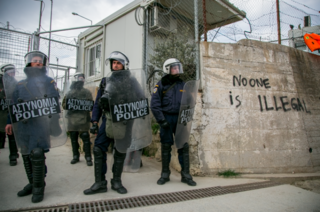Waiting for the Containers
Oscar Webb · On Lesvos
Up to 190 shipping containers are on their way to Lesvos, Samos and Chios, to be used as offices by 600 EU asylum officials and 430 interpreters. According to the terms of the deal between the EU and Turkey that came into effect on 20 March, 'all new irregular migrants crossing from Turkey to the Greek islands … will be returned to Turkey'. Sixty judges will preside over appeals committees – also to take place in containers – for people who do not immediately accept deportation orders. And 2500 police, security and army personnel from Greece and other EU states, with eight ships and thirty coaches, will enforce the deportations. Until the material and manpower arrive, the refugees and asylum seekers are waiting in detention camps on the islands.
On Lesvos, close to a thousand refugees – the unlucky ones who arrived, in some cases only by minutes, after the 20 March deadline – have been placed in the island’s only detention centre, near the village of Moria. They were met at sea and on the beaches by police who took their photos, gave them numbered wristbands, issued them with arrest papers (‘you have been legally arrested … currently you are being held here legally and temporarily … please be patient’) and took them to the camp. More arrive almost every day.
Conditions are bad in the Moria camp. The Greek authorities are struggling to look after the detainees without the help of charities and volunteers. Last week, the UNHCR, Médicins sans Frontières, the International Rescue Committee, Save the Children and the Norwegian Refugee Council all said they were pulling out. ‘Continuing to work inside would make us complicit in a system we consider to be both unfair and inhumane,’ Marie Elisabeth Ingres, the head of MSF’s Greece mission, said. Smaller volunteer organisations have also left the camp.
‘The huts and tents are full, full of women and children. Any newcomers, even families, now have to sleep outside,’ T. told me through the fence. He’s from Afghanistan. Motioning to his friend, he said: ‘We sleep outside on the ground, with one blanket between two of us.’ Food is distributed three times a day by the Greek police. ‘We have to queue for minimum half an hour, maximum one and a half hours – if you go too late, they run out of food,’ T. said.
‘For breakfast we get juice and bread. Lunch and dinner are rice and bread,’ another refugee from Afghanistan said. ‘Water is sometimes available, sometimes not.’
A Greek policeman saw me talking to the refugees through the wire. ‘You need to have permission to be here. All of the regulations have changed now, after the European Union agreement.’
‘Because they are detainees?’
‘Yes, yes. We have different procedures now. You cannot have direct communication with the people. You have to leave now.’
I moved round the perimeter to continue the interview in a place the police couldn’t see me. Half a dozen detainees climbed out of the camp through a hole in the fence. They were going to buy food and cigarettes. They came back twenty minutes later.
Others jump the fence and don’t come back, hoping to disappear in Mytilene or get to the mainland by clandestine means.
In the port, Pakistani, Indian and Moroccan families beg and sleep rough. Many arrived before 20 March but were not allowed off the island. Some try to get on ferries to the mainland using forged papers, dated earlier than 20 March. Those who get caught, often dozens on every ferry, are taken back to Moria, to wait for the shipping containers and judges to arrive.
Read more in the London Review of Books
Frances Stonor Saunders: Where on Earth are you? · 3 March 2016
Ghaith Abdul-Ahad: Some Tips for the Long Distance Traveller · 8 October 2015
